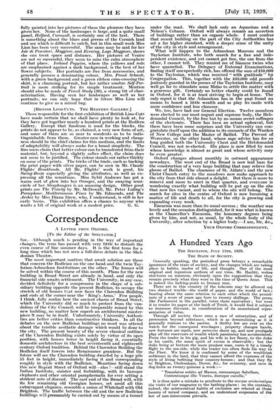Correspondence
A LETTER FROM OXFORD. [To the Editor of the SPECTATOR.] SIR,—Although much is pending in the way of important changes, the term has passed with very little to disturb the even course of fine summer days. It is the first term for a long time which has not seen a full-dress debate in the Shel- doman Theatre.
The most important matters that await solution are those that concern the Bodleian on the one hand and the twin Tay- lorian-Ashmolean Institutions on the other. The former will be solved within the course of this month. Plans for the new building in Broad Street are already in hand, and only the financial side awaits settlement. The University, in any case, decided definitely for a compromise in the shape of a sub- sidiary building opposite the present Bodleian, to occupy the stretch of old houses ft.at now faces the Clarendon Building and ends at the corner near the ' King's Arms.' Few people, I think, fully realize how the ancient charm of Broad Street, which the University did so much to protect from the van- dalism of the City Council, will be irreparably ruined by this new building, no matter how superb an architectural master- piece It may be in itself. Unfortunately, University Authori- ties are better critics than constructive thinkers. In all the debates on the new Bodleian buildings no word was uttered about the terrible aesthetic damage which would be done to the city. The present beauty of the severe classical outlines of the Clarendon Building exists solely by virtue of its open position, with houses lower in height facing it, essentially domestic architecture in the best seventeenth and eighteenth century Oxford tradition. Behind the Clarendon Building the Bodleian itself towers into Renaissance grandeur. But the future will see the Clarendon building dwarfed by a huge pile 55 feet in height, immediately facing it and corresponding roughly in style with the Bodleian. • Meantime facing down this new Regent Street of Oxford will—alas !—still stand the Indian Institute, sinister and forbidding, with its baroque elephants and other oriental paraphernalia for ever setting a strident note of discord. The east end of the Broad will, with its few remaining old Georgian houses, set amid all this extravagant elegance, resemble a union of Whitehall with Old Brighton. The traffic between the old and the new Bodleian buildings will presumably be carried out by means of a tunnel
under the road. We shall lack only an Aquarium and a Nelson'i Column. Oxford will always remain an accretion of buildings rather than an organic whole. I must confess that recent building on the part of the City Authorities has set a far higher standard, with a deeper sense of the unity of the city in style and arrangement. What will happen to the Ashmolean Museum and the Taylorian Institute, who both search for a free and inde- pendent existence, and yet cannot get free, the one from the other, I cannot tell. They remind me of Siamese twins who have quarrelled. The Delegacy of External Examinations finding itself unexpectedly rich, has offered the sum of 110,004 to the Taylorian, which was received " with gratitude" by Congregation. This, together with the £23,000 odd pounds jealously guarded in the purses of the Taylorian Institute, may well go far to stimulate some Midas to settle the matter with a generous gift. Certainly no better charity could be found in Oxford, for it is at least striving to begin at home. The only regret is that the Ashmolean has in the past found no means to hoard a little wealth and so play its cards with more confidence and less clamour.
We, too, have had our General Election. Twelve members were elected to our most august and supreme body, the Heb- domadal Council, by the free but by no means secret suffrages of the electorate. There has been no actual upheaval, but there have been some surprises and the University can con- gratulate itself upon the addition to its counsels of the Warden of New College and the Master of Balliol. The Provost of, Worcester, on the other hand, whose sage advice has for so long guided both the University Chest and the Hebdomadal Council, was not re-elected. His place is now filled by men whose knowledge is almost as great and whose activity may be even greater.
Oxford changes almost monthly in outward appearance nowadays. The west end of the Broad is now laid bare for the construction of a very large building that may relieve the gloom of Balliol. The clearance of St. Aldate's and the new Christ Church entry to the meadows now make approach to the city from that side almost a delight. But there is more to remove and more to erect in that quarter, and everyone is wondering exactly what building will be put up on the site that now lies vacant, and to whom the site will belong. The search for sites in the centre of Oxford is now becoming a matter of life and death to all, for the city is growing and expanding every week.
Encaenia was more than its usual success ; the weather was lovely and the occasion distinguished, for it was what is known as the Chancellor's Encaenia, the honorary degrees being given by him, and not, as usual, by the whole body of the University, after selection by a higher body.—I am, Sir, Sze., YOUR OXFORD CORRESPONDENT,
































 Previous page
Previous page